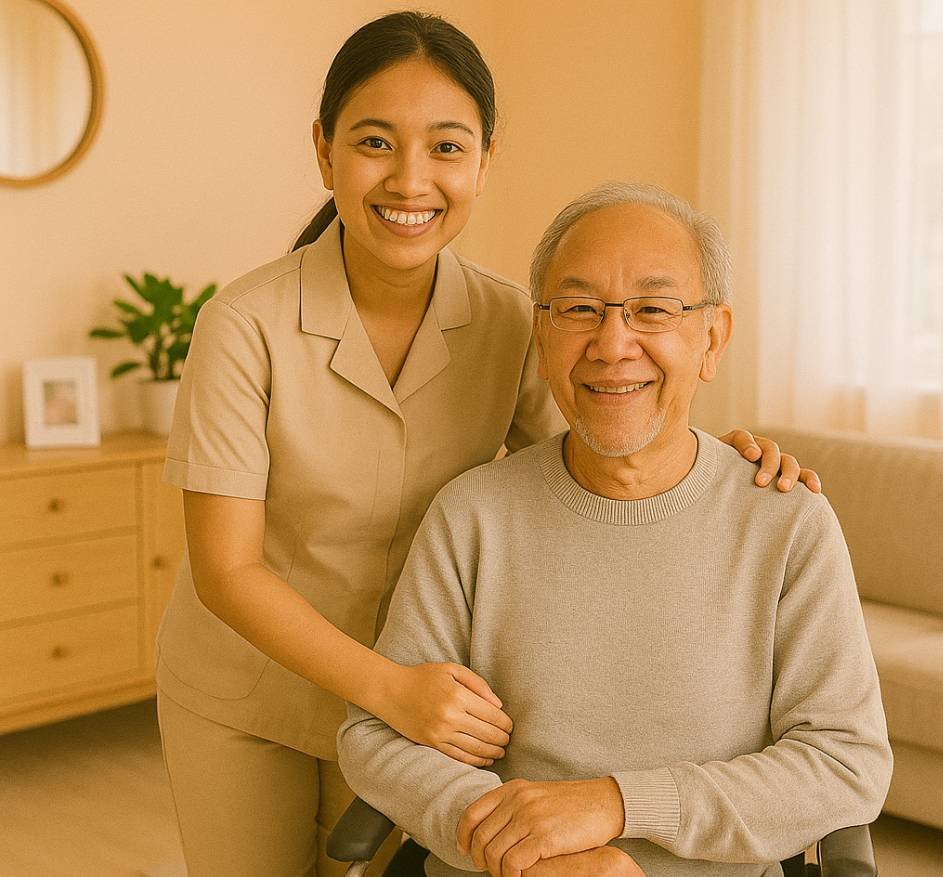Elderly-Care Helper in Singapore
What to look out for when hiring an Elderly-Care Helper?

As Singapore’s population ages, many families seek professional support to care for their elderly loved ones at home. Hiring an elderly-care helper-a foreign domestic worker (FDW) trained in eldercare-is a practical and compassionate solution to provide daily assistance and improve quality of life for seniors. This in-depth guide covers everything you need to know about elderly-care helpers in Singapore, including benefits, training, hiring process, government schemes, salary expectations, and important considerations to ensure the best care for your loved ones.
What Is an Elderly-Care Helper?
An elderly-care helper is a foreign domestic worker specially trained to assist seniors with their daily living activities. These helpers undergo comprehensive eldercare training programs to equip them with skills such as assisting with mobility, personal hygiene, medication management, and fall prevention. The Ministry of Manpower (MOM) and Agency for Integrated Care (AIC) support schemes to facilitate hiring trained elderly-care helpers.
Benefits of Hiring an Elderly-Care Helper
Trained in Specialized Elderly Care: Helpers receive training on ageing, monitoring vital signs, assisting with toileting, bathing, dressing, walking, and medication management.
Improved Quality of Life: Seniors receive compassionate, professional assistance that promotes safety, independence, and dignity.
Relieves Family Caregivers: Families can balance caregiving with work and personal life, reducing caregiver stress.
Access to Government Support: Employers can benefit from levy concessions and caregiving grants to reduce costs.
Flexible Care at Home: Helpers provide personalized care tailored to the senior’s needs in the comfort of their own home.
Elderly-Care Helper Training in Singapore
The Eldercarer Foreign Domestic Worker (FDW) Scheme ensures helpers are well-prepared before and after deployment:
- Pre-Arrival Training: Two days of classroom instruction covering ageing, vital signs monitoring, mobility assistance, medication help, and communication techniques.
- On-the-Job Training: Three hours of practical training at the employer’s home to apply skills learned in real-life scenarios.
- Ongoing Support: Employers can contact participating employment agencies for further assistance and refresher courses.
Helpers with nursing backgrounds may receive additional training and offer more advanced care, though at a higher cost.
Government Grants and Financial Support
1. Home Caregiving Grant (HCG)
The HCG provides monthly payouts of up to SGD 600 (increased from SGD 400) to eligible households to help defray caregiving costs. Eligibility criteria include:
- Care recipient must be a Singapore Citizen or Permanent Resident living with a Singapore Citizen family member.
- Household income per person must be SGD 4,800 or less.
- The care recipient requires assistance with at least three of six Activities of Daily Living (ADLs): feeding, dressing, toileting, washing, walking/moving around, and transferring from bed to chair.
You can read more about HCG here: Home Caregiving Grant (HCG)
2. Foreign Domestic Worker Levy Concession
Households hiring an elderly-care helper may qualify for a reduced monthly levy of SGD 60 instead of the standard SGD 300, easing the financial burden.
3. Additional Subsidies and Schemes
Budget 2025 introduced enhanced subsidies for long-term care services, including home-based care, and expanded eligibility for senior-friendly home modifications. You can read more about it here: Grants
How to Hire an Elderly-Care Helper in Singapore
1. Assess Your Elderly Family Member’s Needs
Evaluate the level of assistance required, such as mobility support, medication management, or companionship.
2. Engage a Licensed Employment Agency (EA)
Choose agencies participating in the Eldercarer FDW Scheme to access pre-trained helpers and expert guidance.
3. Step 3: Understand Eligibility and Employer Requirements
Employers must be at least 21 years old, not bankrupt, and capable of providing suitable accommodation and rest days for the helper.
4. Apply for Work Permit and Levy Concession
Submit work permit applications through MOM’s online portal and apply for levy concessions if eligible.
5. Prepare Your Home and Family
Ensure safe living conditions, provide orientation to the helper, and establish clear communication channels.
Salary and Cost Expectations for Elderly-Care Helpers
Monthly Salary: Typically ranges from SGD 550 to SGD 750, depending on experience and skills.
Maid Levy: Standard levy is SGD 300/month, but levy concession reduces it to SGD 60 for eligible elderly-care employers.
Agency Fees: Vary depending on the agency and training provided.
Important Considerations When Hiring an Elderly-Care Helper
- Helper’s Experience and Training: Prioritize helpers with formal eldercare training or nursing backgrounds.
- Compatibility: Ensure helper’s personality and caregiving style align with the senior’s preferences.
- Communication: Clear instructions and patience are essential, especially if language barriers exist.
- Legal Compliance: Follow MOM regulations on employment contracts, rest days, and medical requirements.
- Caregiver Support: Utilize government grants and schemes to ease financial and caregiving burdens.
Conclusion
Hiring a trained elderly-care helper in Singapore offers families compassionate, skilled support for their seniors while alleviating the physical and emotional demands of caregiving. With government schemes like the Home Caregiving Grant and levy concessions, families can access affordable, quality care at home. By selecting helpers through the Eldercarer FDW Scheme and adhering to MOM requirements, employers ensure safe, respectful, and effective care for their loved ones.
For more comparisons and guides, explore our other articles!